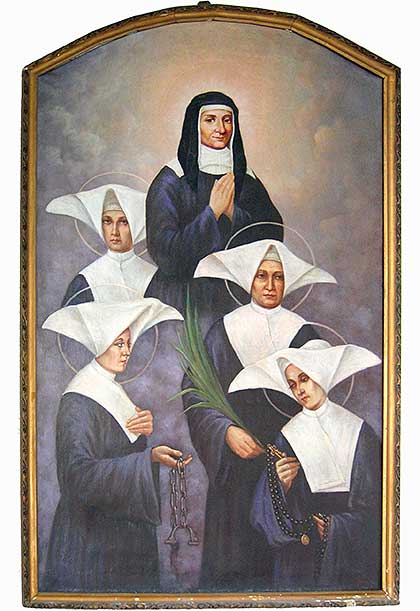Name that Saint: Enemies of the State
Enemies of the State

The Daughters of Charity were in a difficult situation. The House of Charity in Arras, France—founded by St. Vincent de Paul and St. Louise de Marillac in 1656—had an unbroken history of sisters living under its roof, visiting the poor, and running a dispensary for the sick and a school for girls.
Then the French Revolution began.
The sisters (Marie-Madeleine Fontaine, Marie-Françoise Lanel, Thérèse Fantou, and Jeanne Gérard) continued their ministries, and bravely added a new one: helping people escape into Belgium, including their two youngest sisters, Rose Michau and Jeanne Fabre.
Sadly, their assistance to the sick and poor wouldn’t last much longer.
The new government disbanded religious congregations, and priests and former religious who remained in France became employees of the state. The civil authorities required them to take an oath of loyalty to the new regime, which forced them to renounce their Catholic faith. Anyone who refused to pledge allegiance to the revolutionary system, continued to practice their Catholicism, or renounced the desecration of churches and Catholic symbols, was considered a “counter revolutionary.”
The Daughters of Charity knew that by remaining in Arras, they would most likely end up in prison or dead. Yet, they stayed to continue helping the poor.
In February 1794, a government representative took possession of the House of Charity and renamed it the “House of Humanity.” The Catholic paintings and religious articles were removed, and the official kept a close eye on the sisters, hoping to catch them in subversive activities.
Within two weeks, the sisters were arrested and imprisoned for not taking the oath and for having “counter revolutionary” newspapers (there is evidence that the newspapers “found” in the house were planted by the daughter of the official who confiscated the sisters’ house and belongings).
Like thousands of other faithful priests, religious, and lay people, the sisters became victims of a kangaroo trial filled with chaos and humiliations. Their only crime was their allegiance to Catholicism.
The ”judges” promised them freedom if they took the oath. Then they tried appealing to the sisters’ sense of justice, saying that the oath was necessary for the safety of the Republic.
But the sisters were resolute. They refused to take the oath. Immediately, they were sentenced to death for being “pious anti-revolutionists.” That night, the sisters were transferred to Cambrai to be killed.
As they were being taken to the guillotine, the sisters peacefully prayed the Rosary and sang the “Ave Maris Stella.” Typically, jeering crowds followed the carts of prisoners being transferred to their place of execution.
Not this time.
There was a silence over the crowd. Some people cried, but Sr. Fontaine told the people to not weep because the days of terror would soon be over. “Have confidence,” she said. “We are the last victims.”
Her words were prophetic. The sisters, who were guillotined on June 26, 1794, were the last victims in Cambrai. The fall of Robespierre occurred the next day.
Pope Benedict XV pronounced them “Blessed Virgins and Martyrs” on June 20, 1920. Their feast day is June 26.
Blessed Marie-Madeleine Fontaine, Marie-Françoise Lanel, Thérèse Fantou, and Jeanne Gérard, pray for us.
All images used with permission, depaul.edu
Discover more about our Vincentian saints.
Get InSPIREd!
Sign up below and receive our monthly inspirational Newsletter dedicated to Mary!


